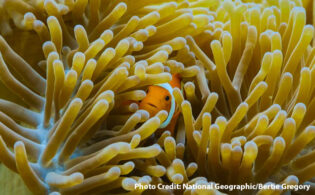From National Geographic, Nat Geo Explorer at Large James Cameron (Avatar), the BBC Studios Natural History Unit (Blue Planet II) and OceanX, the brand-new natural history series OceanXplorers delves deep into the world’s waters aboard a state-of-the-art research vessel. The title, armed with advanced technology and a group of top-tier explorers and scientists, is set to premiere on August 18 on National Geographic, with all episodes to stream the next day on Disney+ and Hulu. Ocean technology innovator Eric Stackpole speaks with TV Real Weekly about his experience on the team, what it was like working with the legendary Cameron and other industry giants and the innovation that OceanXplorers is bringing to the factual space.
TV REAL: How did you get involved in OceanXplorers?
STACKPOLE: The beginning of my career started with space exploration. I was working at NASA’s Ames Research Center, and I realized that it takes a rocket to get to space, but underwater, all you need is a shoreline and some curiosity. It is teeming with life we’ve never seen. It’s an amazing place to explore, yet hardly anyone seems to be looking. So, I started a company to build low-cost robotic submarines, and that got the attention of Maria Wilhelm and James Cameron. As you know, James Cameron is really interested in ocean exploration. As we got to know each other and OceanXplorers started to evolve, they suggested that I try out for [the cast]. When I got cast, it was an immediate yes. This is what I want to do with my life. We are living on a planet that is so unknown; there’s so little that we know about it. If we can get more eyes looking at the rest of the world, that will be one of the greatest things we can do to impact our ability to change it for the better. It’s a great opportunity to see the world and to share what we see with others.
TV REAL: You mentioned James Cameron. Tell me more about what it was like to work with him and Nat Geo.
STACKPOLE: This is the combination of the all-stars. We have James Cameron, who is an incredible storyteller and is deeply passionate about ocean exploration. Combine that with National Geographic, which is the best in the world at telling these stories to an audience. Also involved is BBC Studios, which made Blue Planet, the very best film in natural history. This is the dream team, and we were all working with OceanX, which has the OceanXplorer, a state-of-the-art research vessel. For me, being able to be with the very best people, who are skilled and passionate, was an extremely awesome experience. It definitely made me feel like I needed to step my game up to keep pace. What we experienced was second to none. I still think back on it; it feels like a dream. It’s crazy now that the trailer is out and people can see what it’s all about. I keep saying, Wow, that really happened…and they caught it on camera!
TV REAL: On top of the expertise from all the “dream team” players involved, what makes OceanXplorers appealing to audiences? Why do shows like this matter?
STACKPOLE: What’s incredible about OceanXplorers, compared to just about anything I’ve ever seen or been a part of before, is that we’re not just going to a place where we know a phenomenon happens to film it. This actually follows real scientists and explorers. The scientists we’re working with are publishing papers based on the discoveries that we’re making. There certainly were some great successes that we had, which you’ll see, but there were also some failures. It doesn’t always work as planned. This is a show that brings the audience through the actual process, from going there to solving the problems that inevitably come up when you’re doing fieldwork. I hope that people will not just get a better understanding of nature, but they’ll get a better understanding of how it is that we try to understand nature in the world that we live in.
TV REAL: Tell me more about your career and how you merged your Sofar Ocean Technologies journey with television.
STACKPOLE: I’ve always been interested in democratizing exploration and making it so that the technology that allows us to understand our planet is more accessible. After working at NASA, I started out designing these really low-cost remotely operated vehicle (ROV) submarines to help democratize exploration. For $1,000, you could put this thing in the water and go deeper than a scuba diver and see things no one’s seen before. Later on, we merged to become Sofar Ocean Technologies, where I work now. We’re creating buoys that are spread out throughout the world’s oceans, making a nervous system for the planet by having these low-cost sensors in many places. We’re able to do science that’s different than if you just had a few pristine sensors in very few places. Throughout this career of building these low-cost devices, I’ve learned what’s really required to understand our planet. We need to look in more places and get more data.
Fast-forward to the complete other side of the spectrum. For the OceanXplorers television show, I was able to be aboard one of the finest research ships on the planet, using some of the best technology and working with the very best people in the world to do this sort of research. I’ve been able to see what is possible when you put resources and effort, in a focused way, into trying to understand these things. It’s been an incredible journey to go from making things that are low-cost with off-the-shelf parts, all the way through to using the finest equipment available on planet Earth.
TV REAL: With that in mind, the possibilities for this series are as endless as science, right? What do you think is next for the program and your research?
STACKPOLE: If there is ever another opportunity to do this again, I would jump on it because it has completely changed my life. It’s so easy to be here on terra firma and take for granted the entire planet’s worth of life that exists currently. We live on a minority of our planet; 80 percent of the world’s oceans have never been explored. I’m going to keep moving forward in that charge.
Right now, I’m working on my own separate project to build an autonomous, solar-powered underwater vehicle that can run for a long time. I’m developing other types of technologies at Sofar. I’m working on a buoy that can be thrown out of an airplane in front of a hurricane and tracks where the hurricane goes and how much storm surge it will create. There are so many things out there that we can understand, and if we can create the right technology, it’ll allow us to gain these new perspectives. That’s what I want to spend the rest of my life doing. It’s an incredibly addicting thing to see the world and realize that we’ve only scratched the surface. I hope we’ll get more chances to explore this amazing planet we live on.
 TVREAL
TVREAL






